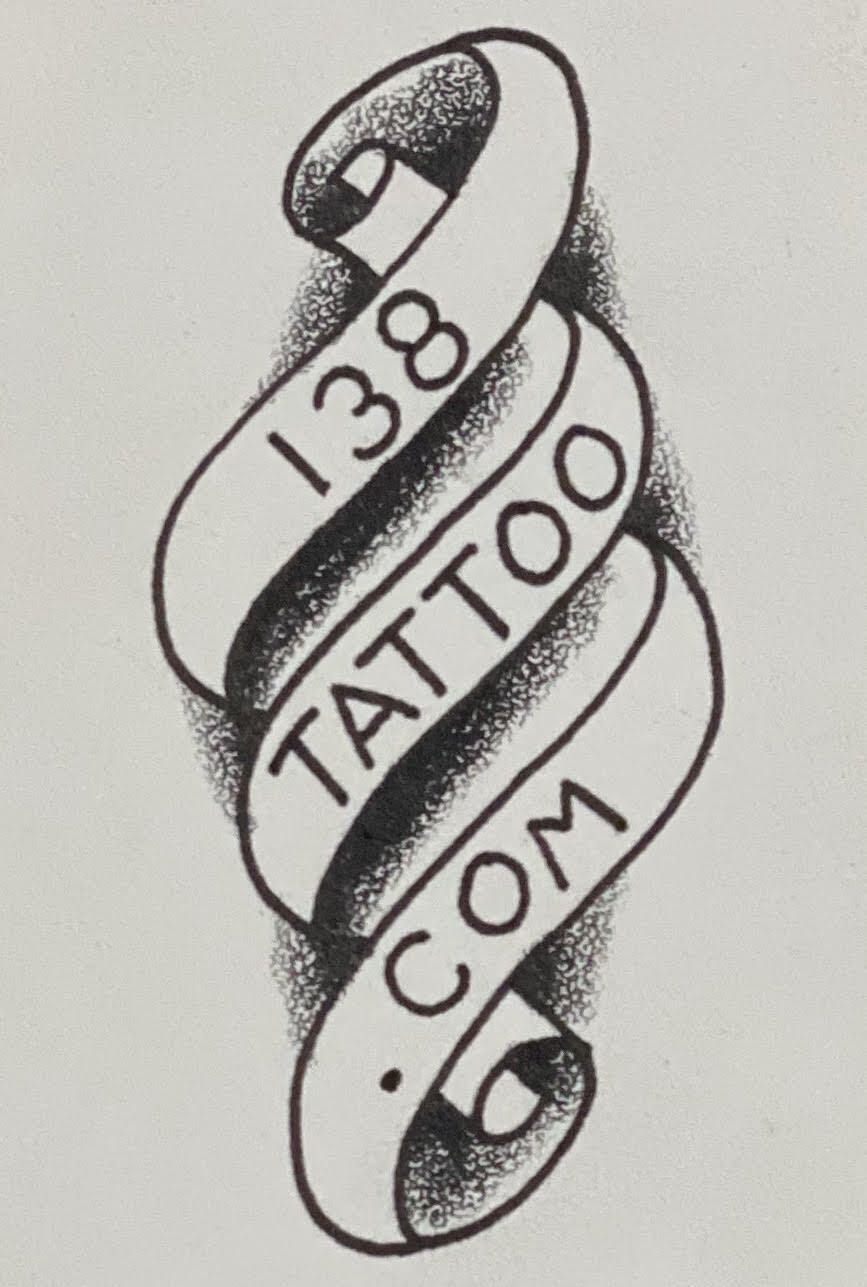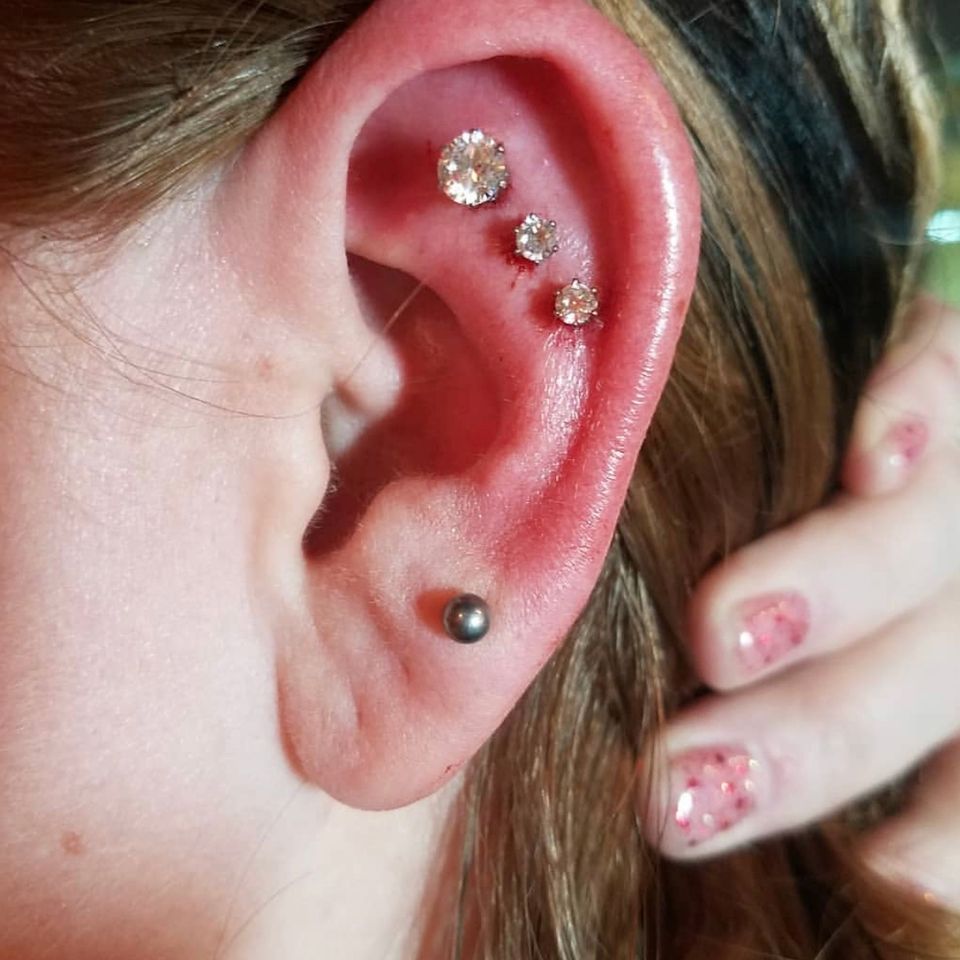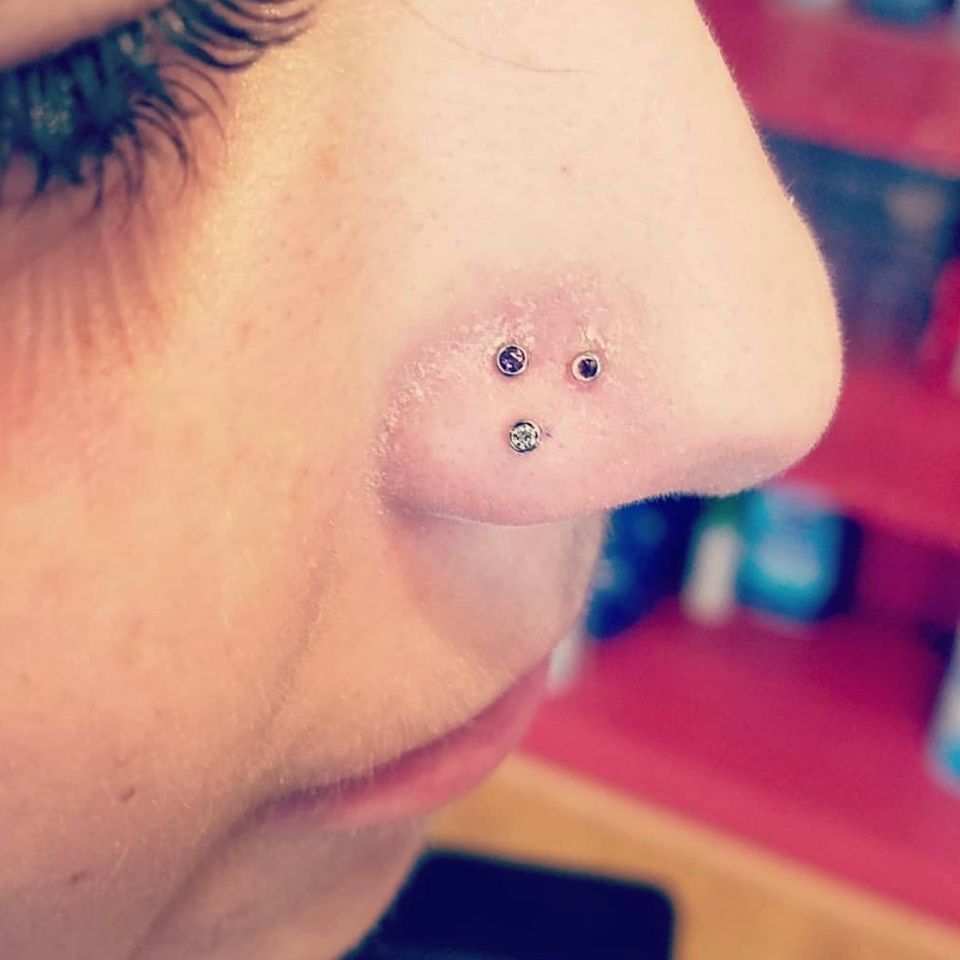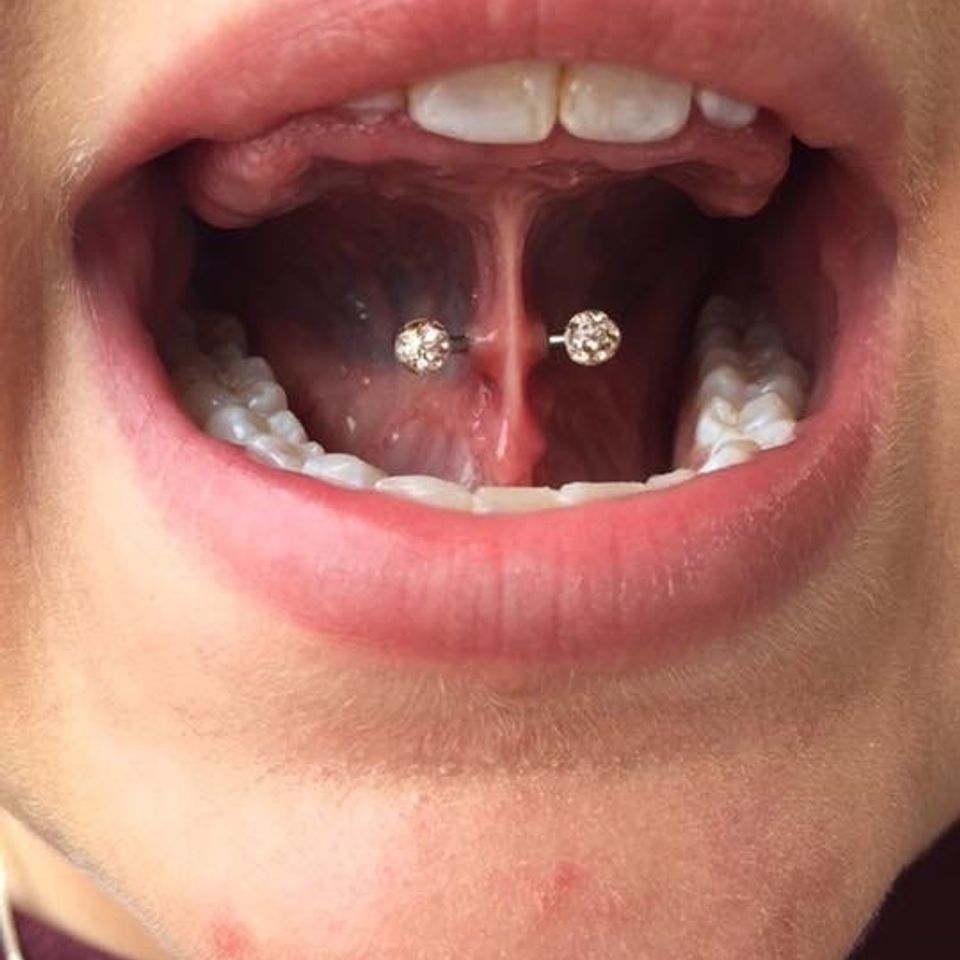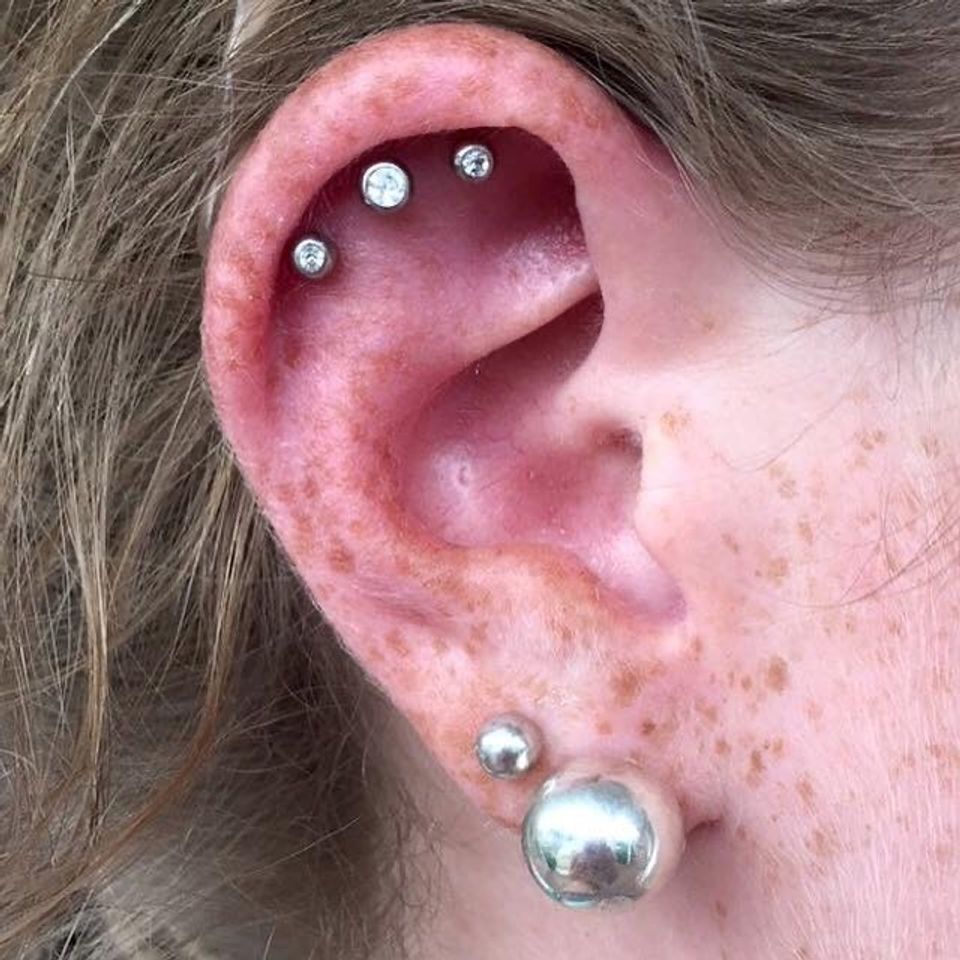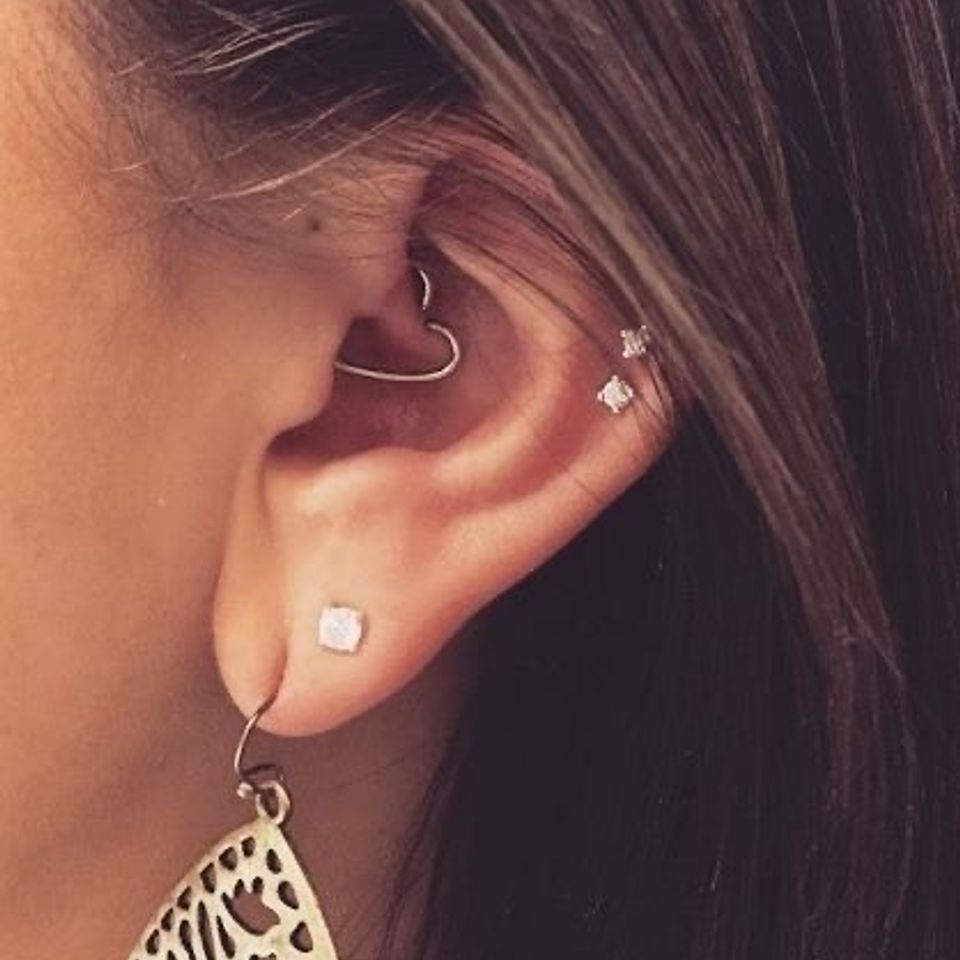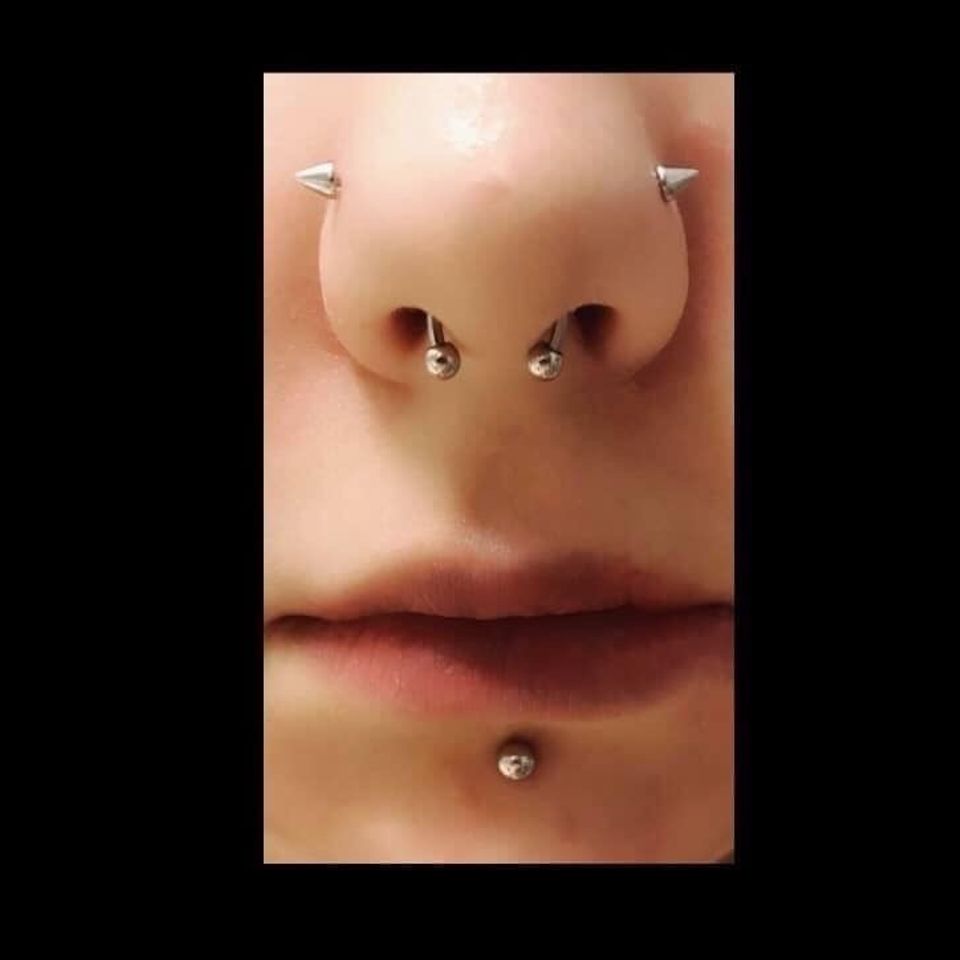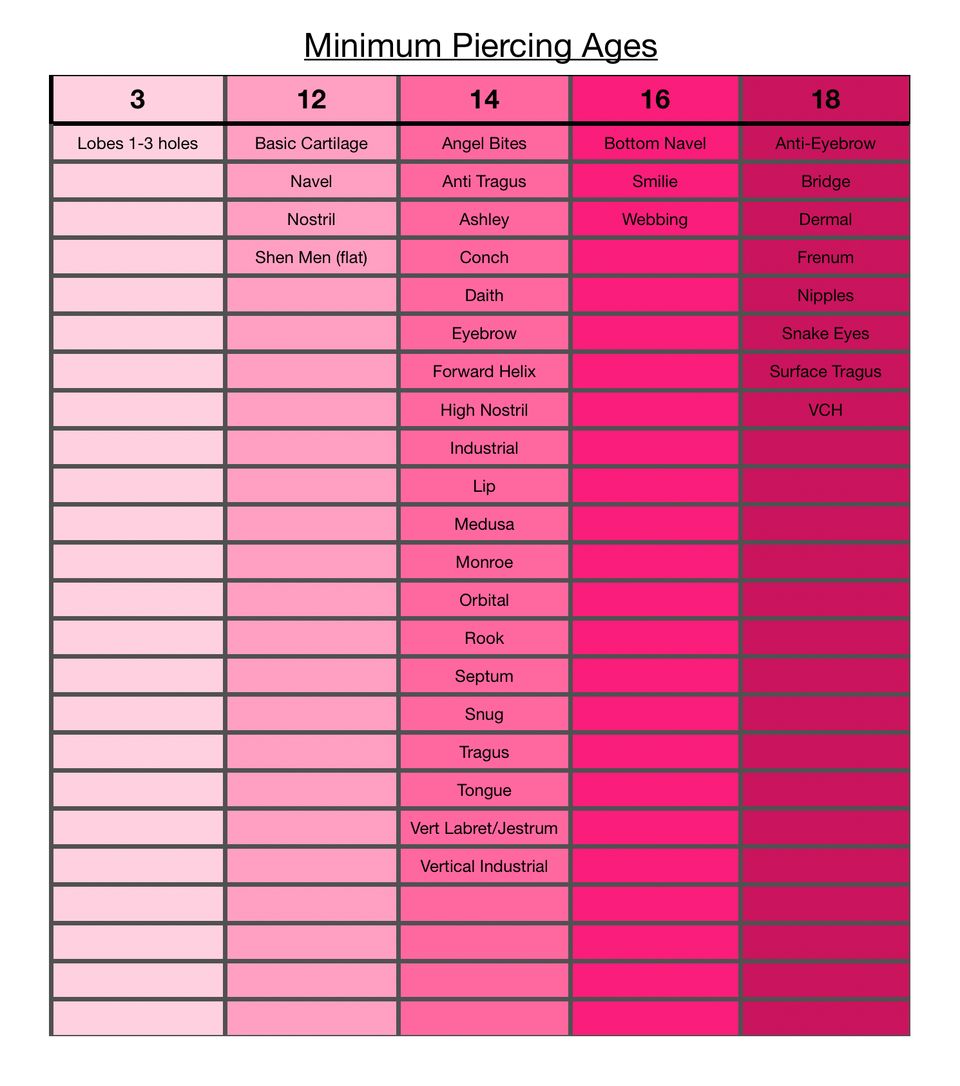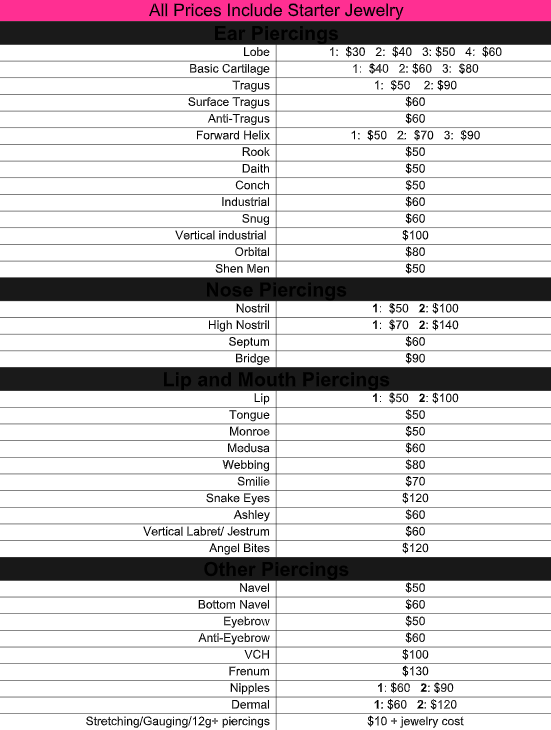
Piercing Aftercare
How to Clean Your Piercing
Choose ONE and stick with it: • Soap: A mild, fragrance-free liquid antibacterial or antimicrobial soap such as gold Dial hand soap, or Provon available for $5. • Saline: A packaged sterile saline solution designed for wound care, or H2Ocean available for $10. • Non-Iodized Sea Salt Solution: dissolve ¼ teaspoon of non-iodized salt into one cup (8 oz) of warm distilled water. (Stronger doesn’t mean better, it may cause dryness and irritation!)
Wash your hands before you clean or touch your piercing. Soap only 1-2 times per day. Soak off any scabbing and discharge with warm water. Lather a dime size drop of soap and clean your jewelry and the piercing site. Rinse thoroughly. Saline about 3-4 times a dayby spraying a small spritz to all sides of your piercing and letting it air dry.
Sea Salt soak for 5-10 minutes once or more per day. Seal a cup of warm sea salt solution over the area. For some piercings, it will be easier to use clean gauze or paper towels. Rinse briefly to remove any residue. Pat dry with a paper towel. Alcohol-free mouthwash is recommended for all oral piercings, but the sea salt solution can also be used. Rinse your mouth for 30 seconds after eating, drinking, or smoking, and at bedtime—about 4-5 times a day.
Cleaning too often or with solution that is too strong with cause irritation and discoloration of your mouth and piercing. Dermal Anchors only require one cleaning a day to avoid irritation and sensitivity. Rinse with warm water in the shower or with a cotton swab or gauze. Then carefully clean around the site with salt water and ease off any crust with your fingers. Rinse thoroughly and air dry.
What is Normal with Healing?
For the first week, some swelling, bleeding, bruising, and tenderness can be expected. Cold drinks and ice for oral piercings—or cold compresses for other piercings—along with OTC anti-inflammatories, such as, Ibuprofen or Advil, can help reduce your pain and swelling. We do not prescribe these medications so read and follow all instructions on the label.
Remember, piercings heal from the outside to the inside making them appear healed before they actually are. Although it may feel fine, the tissue on the inside is still fragile. Infection from a body piercing is rare, and most commonly occurs from poor aftercare. Be patient and keep cleaning throughout the entire healing period.
Good Aftercare = Great Piercing Things to Avoid
Avoid cleaning with rubbing alcohol, hydrogen peroxide, Bactine, and mouthwash that containsalcohol as they can damage or irritate your piercing. Avoidirritation like friction from clothing, too much motion in the piercing location, playing with the jewelry, or rough cleaning as it can cause uncomfortable scar tissue.
Avoid touching with dirty hands, contact with other’s bodily fluids and direct contact between your piercing and pets during the first 2 weeks because they are common sources of disease and infection.
Avoid submerging your piercing in a lake, pool, or hot tub without protecting it with a waterproof bandage.
Avoid all beauty and personal care products on or around the piercing, including makeup, lotions, and sprays. Remember alcohol may cause bleeding and recreational drugs can slow the healing process.
Tips and Tricks
Unless the size, style, or material of the jewelry is causing you issues, leave it in for the entire healing period. If you have an emergency and need to change your jewelry, come see us and we will help you, free of charge! If your metal jewelry needs to be removed for a medical procedure, schooling or sports, we have non-metallic retainers, some colored and some clear, that we sell for $10. Even if you have had your piercing for years, it can still shrink and close in minutes if you take out your jewelry.
Each person is different, so if you like your piercing always keep jewelry in! Always check the tightness of you threaded ends daily while cleaning. Movement and shifting of dermal anchors is normal and will settle during healing. Gently massaging at the base of the piercing with each cleaning to help it settle into place. If you think you have infection, leave in quality jewelry so it can drain. If you remove it, it can close and trap the infection inside. Please come see us if you have any concerns about something going on with your piercing.
Do not remove jewelry unless instructed to by a medical professional or professional piercer. If you decide you don’t want your piercing anymore, simply remove the jewelry, or we can help, and continue to clean it until the hole closes.
We have Licensed Body Piercers available 7 days a week (unless otherwise posted on our Facebook page) Feel free to contact us or come by with any questions!
Allow Time for Your Piercings to Heal
Ear Lobes - 1 to 3 months - Be careful about talking on the phone, brushes and clothing
Cartilage - 6 months to 1 year - Be careful about talking on the phone, brushes and clothing
Eyebrow - 1 to 3 months - Be careful about brushes, clothing makeup
Nostril - 1 to 3 months - Be careful about makeup, facial soaps
Septum - 1 to 5 months - Be careful about makrup, facial soaps
Naval - 1 to 3 months - Be careful about clothing, lotions, hot tubs and swimming pools
Tongue - 1 to 3 months - Be careful about gum, foods that can get stuck around jewelry and smoking
Labret - 1 to 3 months - Be careful about oral contact, makeup, facial soaps, hot tubs and swimming pools
Dermals - 3 to 4 months - Be careful about clothing, lotions, makeup, facial soaps, hot tubs and swimming pools
Nipples - 1 to 3 months - No tugging, try compression-style tops
Genitals - 1 to 3 months - Leave alone for 1 to 2 weeks
Cartilage - 6 months to 1 year - Be careful about talking on the phone, brushes and clothing
Eyebrow - 1 to 3 months - Be careful about brushes, clothing makeup
Nostril - 1 to 3 months - Be careful about makeup, facial soaps
Septum - 1 to 5 months - Be careful about makrup, facial soaps
Naval - 1 to 3 months - Be careful about clothing, lotions, hot tubs and swimming pools
Tongue - 1 to 3 months - Be careful about gum, foods that can get stuck around jewelry and smoking
Labret - 1 to 3 months - Be careful about oral contact, makeup, facial soaps, hot tubs and swimming pools
Dermals - 3 to 4 months - Be careful about clothing, lotions, makeup, facial soaps, hot tubs and swimming pools
Nipples - 1 to 3 months - No tugging, try compression-style tops
Genitals - 1 to 3 months - Leave alone for 1 to 2 weeks
